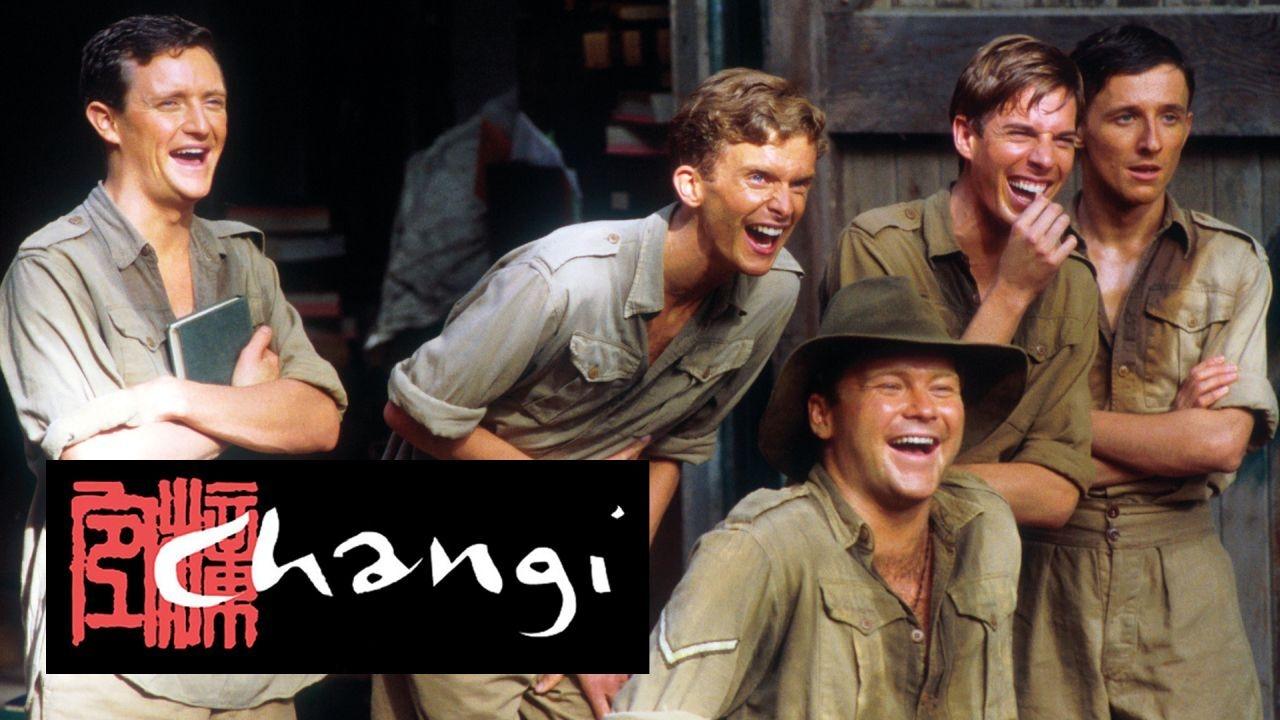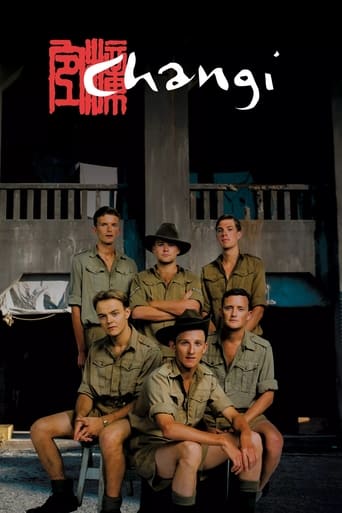



The greatest movie ever made..!
Nice effects though.
Instant Favorite.
Easily the biggest piece of Right wing non sense propaganda I ever saw.
View MoreThis has got to be one of Australia's best productions. I completely disagree with the comments made by 'RamiNour101'.This series shows the depth of Australian mateship and the lengths they went to to help each other out. Episode Five 'Eddies Birthday' is a great example of this and it really captures the Australian spirit.The music used throughout the series only emphasised the situation that the men were faced with, their longing for home and their loved ones. The numerous amusing renditions of The Road to Gundagai captures the spirit of the men and the fact that they never forgot home, and that it was little elements such as the singing of a song that took them home for a short while.As for the comment about it being racist towards Japanese people, the only thing to be said is that you can't change what happened. The Japanese did treat the Australians very poorly in Changi and to represent it as otherwise would be very misleading indeed. The comment about the screenplay being in accurate is also false. These six stories that are told in the series are composed from real P.O.W experiences.The actors were superb; the best being in my opinion, Matthew Newton. His performance as David in the first episode was gut wrenching. From being a city boy, to being another nameless face to his captors. We see him change dramatically in the first episode because of his violent attack in the jungle, and in further episodes we can see how that one event has changed him, he is more aware of what is really going on and is always one of the first to help out the other members of The Secret Nine.Stephen Curry also deserves a mention. His performance in 'Eddie's Birthday' is amazing, going from the larrikin of the group, to being sick, weak and unable to take care of himself. The displays of mateship in this episode touch you on an emotional level and make you proud to be Australian.I study WWII at university level and have found this series, if not physically truthful, spiritually truthful, as it captures the true spirit of what it was to be an Australian Soldier.Well done to John Doyle for capturing the spirit of Changi.
View MoreI have an advantage in reading other's comments before making my own. I have heard this "accuracy" comment about other movies/mini-series before and I really don't understand people's statements. Visual stories about historical events are never accurate unless they are documentaries. Beautiful Mind, and Seabiscuit are both examples of movies about true events that were off the mark where telling the whole truth is concerned. I liked Changi because it showed the effects of war on soldiers both at the time of the event, and on their future lives. I thought the flash backs, both forward and backward, were fine--after all I want to watch a story that makes me use my brain, not just be mindlessly entertained. I thought the humor at times was sophomoric, but weren't most the soldiers in WWII of the age to be sophomoric? I loved the music, and I thought the "Singing Detective" type transition into song was very believable here, as the human mind in times of stress, pain, and torture will use its own devices to preserve sanity--the song sequences could be the writer's depiction of one way the human soul protects itself. How many of you have experienced completely weird dreams while suffering from an illness accompanied by high fever?--this is my point. As to the Japanese captors and the way they were portrayed--the commander here was, in my opinion, a detached person that let his underlings assume all of the responsibility for the horrid treatment of the POWs while the commander fed his bird and listened to music--totally detached, and I think in the end out of touch with reality. As for Lt. Aso, it was plain to see that this character was both bitter and jealous and took this out on his charges. Lt. Aso was bitter that he was not in the thick of the war instead of being stuck at Changi in charge of insulting, spirited, enemy prisoners. He also could not figure out why these enemy soldiers made jokes to laugh at, and sang songs to buoy their spirits.I also thought the story showed that in a normal situation these six blokes would not have been friends. Their personalities were to varied--from the supremely bright to the un-educated; incredibly brave to perpetually cowering; passively innovative to unbelievably creative. However, under the situation of a POW camp these diverse individuals came together and drew from each other's strengths in order to survive, and in that situation became mates. Rowdy was the father/headmaster figure that the six turned to in times of trouble that was above their expertise. Rowdy also was available to buck them up when their spirits were flagging, and gave them hope that they would survive.I'm buying this DVD for my WWII collection.
View MoreChangi has a delightfully fresh script, acted superbly by both young and old actors alike. John Doyle has done an excellent job bringing humour to a tragic true story, keeping a sometimes sad story fun and engrossing, particularly to those of us not familiar with the events of South East Asia during WW2.John Doyle's parallel story line successfully bridges the gap between past and present, allowing the audience insight into the long-term effect war had on the prisoners and their family's lives as well as providing the basis for an excellent narrative which nicely rounds out the tales, both individual and collective. Doyle deserves praise for this effort. We have in the past been delighted by his abundant and quick-witted humour as evidenced in his long running collaboration with Greg Pickhaver as `Roy & H.G.'As the series is approaching half way, we are looking forward to how the story develops with anticipation.
View More"Changi" is an Australian comedy/drama set in the World War 2 Japanese prisoner of war camp of that name. The story cuts between past events, and the present day, when the aged veterans plan a reunion. This is a much publicised and controversial miniseries, here in Australia. The budget ran over ($6.5 million Aust. dollars); historians and veterans criticised it's authenticity; and critics pilloried the uneasy mix of comedy and drama (shades of "Pearl Harbor"). Series writer John Doyle (half of the successful Roy & H.G. comedy team), has tried to defend himself with comments about "the characters are composites of actual people"; "the troops used comedy to cope with the situation"; "it's only based on actual events"; "one of our actors was actually there" etc. I don't have a problem with any of these points. Many superb fictional and factual dramas have come out of the Japanese P.O.W. camp experience: "King Rat", "Tenko", "Merry Christmas Mr. Lawrence", "Bridge on the River Kwai", "Paradise Road", "Empire of the Sun", "Blood Oath", and "A Town Like Alice". Black comedy has often been used successfully in P.O.W dramas: "Life is Beautiful", "The Great Escape", "Seven Beauties", "Stalag 17", "The Colditz Story", and even "Hogan's Heroes". So why is "Changi" a monumental failure? - the acting in "Changi" is uniformly excellent, the music and cinematography is good - it is the writing and direction that have let it down. Every scene seemed to give me waves of deja vu. When Anthony Hayes is made to stand in the blazing sun, I thought "Didn't I see Alec Guinness do this in "Bridge on the River Kwai"?". The sudden flashes into surreal song & dance brought back Dennis Potter's "Singing Detective", but without the finesse. This borrowing happened so often, it smacked of lazy writing by cut and paste, rather than homage. The constant intercutting between the past and present stories left me unable to concentrate on either. Flash forward and flash back can be a useful tool - here it left me distanced from characters, where intensity was called for. The "Ausiness" is overdone - every conversation seemed to include "stone the bloody crows" & such, that I was saying "I get the point, I know they're Aussies". Cultural stereotyping extended to the British and Japanese too -sadistic young Japanese officer; uptight British officer; wiser Japanese commandant; fun-loving, rascally Aussies etc. I thought I was watching "Hogan's Heroes on the River Kwai". After 3 episodes I'm tuning out.
View More